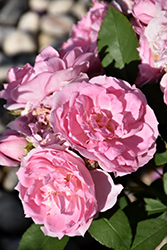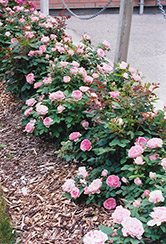>> Home
Height: 4 feet
Spread: 5 feet
Sunlight:
![]()
Hardiness Zone: 2b
Group/Class: Parkland Rose
Description:
A recent Parkland series introduction, featuring large clusters of cheery double pink flowers all season long; hardy and resistant to disease, mounded habit, makes a great flowering hedge; all roses need full sun and well-drained soil
Ornamental Features
Prairie Joy Rose is blanketed in stunning fragrant double pink flowers with shell pink overtones at the ends of the branches from late spring to late summer, which emerge from distinctive rose flower buds. The flowers are excellent for cutting. It has dark green deciduous foliage. The oval compound leaves turn yellow in fall. The fruits are showy orange hips displayed from mid to late fall. The spiny brick red bark adds an interesting dimension to the landscape.
Landscape Attributes
Prairie Joy Rose is a multi-stemmed deciduous shrub with a more or less rounded form. Its average texture blends into the landscape, but can be balanced by one or two finer or coarser trees or shrubs for an effective composition.
This is a high maintenance shrub that will require regular care and upkeep, and is best pruned in late winter once the threat of extreme cold has passed. Gardeners should be aware of the following characteristic(s) that may warrant special consideration;
- Spiny
Prairie Joy Rose is recommended for the following landscape applications;
- Mass Planting
- Hedges/Screening
- General Garden Use
Planting & Growing
Prairie Joy Rose will grow to be about 4 feet tall at maturity, with a spread of 5 feet. It tends to fill out right to the ground and therefore doesn't necessarily require facer plants in front. It grows at a fast rate, and under ideal conditions can be expected to live for approximately 20 years.
This shrub should only be grown in full sunlight. It does best in average to evenly moist conditions, but will not tolerate standing water. It is not particular as to soil type or pH. It is somewhat tolerant of urban pollution. This particular variety is an interspecific hybrid.

